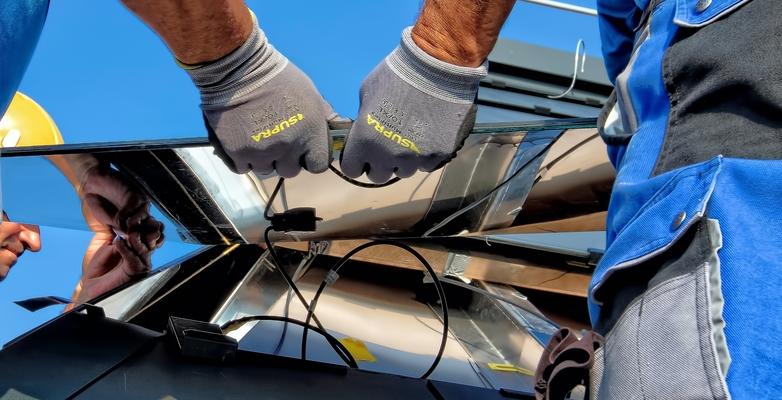
The American Climate Corps Aims to Redefine How We Think About Work
In a warming world, your job is the new climate action.
You’ve got to hand it to the Biden Administration. Behind the alphabet soup of names like the Inflation Reduction Act (IRA) and now the American Climate Corps (ACC) that feel market-tested for whatever the opposite of marketing is, the administration has done an exceptional job of hiding some quietly revolutionary thinking on climate in plain sight.
Last year, in between the champagne corks popping and the excitement over all the new consumer tax incentives, one of the features of the IRA that flew at least somewhat under the radar was its animating belief that the US economy – that massive and nebulous combination of everything we make and do to eat, work, play, and more and which has historically been one of the biggest contributors to climate-changing greenhouse gases – could instead become the biggest force for climate action the world has ever seen. Not only that, but that this transformation of the US economy into a climate action superpower will make life better more broadly for well, everyone. And in ways people could immediately appreciate, like clean air and more job opportunities and lower power bills.
This year, the administration repeated the trick with the ACC, which in many ways is the second beat of the IRA story.
On the face of it, the ACC – with its nod back to the New Deal programs that put some 8.5 million people to work in the 1930s and 40s – is another government job training program that pays young people to learn on the job and get the skills to jumpstart their careers. All good.
As the White House says:
“The American Climate Corps is a new initiative that will provide the next generation of Americans with job training and service opportunities to work on a wide range of projects that tackle climate change – including restoring coastal wetlands to protect communities from storm surges and flooding, deploying clean energy, managing forests to improve health and prevent catastrophic wildfires, implementing energy efficient solutions to cut energy bills for hardworking families, and more.”
There are clearly more details to come, but what’s remarkable here is the expansive understanding of what climate action means and emphasis on an energy transition that works for everyone. To put it another way, we’re talking about training people to manage forests and wetlands to help mitigate more of the record-breaking fires and deadly storm surges that come with climate-fueled extreme weather.
But we’re also talking about training electricians and other trades workers, fields that historically haven’t always been part of the conversation on green jobs, climate action, and just transition. With the US already facing an electrician shortage, these are exactly the kinds of workers we (desperately) need to make good on the IRA’s potential to transform the economy writ large and face the climate challenge ahead.
Already five states – California, Colorado, Maine, Michigan, and Washington – have similar programs and during Climate Week five more – Arizona, Utah, Minnesota, North Carolina, and Maryland – launched initiatives of their own.
It feels safe to say that the vast majority of electricians and many others in trades probably never thought of themselves as taking part in climate action just by clocking in every day. But with the race on to install as many heat pumps, induction stoves, EV chargers, and more as fast as we can, that’s exactly what’s happening. And the ACC aims to help create a good-paying pathway for young people to be part of it too – all while entering a well-paid field that doesn’t need an expensive college degree.
Whether by design or not, there’s a larger message here. In a world where we all just lived through the hottest month on record and witnessed lethal heatwaves, fires, and floods seemingly hit all at once all across the planet, the lines between where climate change begins and ends are increasingly fading into irrelevance.
If we accept the IRA’s central premise – that we need an all-in, all-sector approach to stopping rising temperatures – then it follows we’re going to have to rethink what climate action is. The implicit argument of the ACC is that for many of us, work is the new front line of the climate fight – and the sooner we acknowledge that, the better we’ll do. After all, you don’t need a crystal ball to see that more and more careers and sectors with exactly zero mentions of climate change in job descriptions will be touched by climate impacts. Insurance adjuster in a world of super storms? You bet. Delivery driver waking up to another day of record heat? Same.
The challenge here is to grab the incredible opportunity we have to build a tomorrow that’s a whole lot better than today. Remember that the fossil fuel economy not only brought us global warming but air pollution that contributed to an estimated one in five deaths worldwide in 2018. Which is a way of saying that shifting to clean energy won’t only help us stop rising temperatures and create an estimated 10.3 million new jobs worldwide by 2030, it’ll also save millions and millions of lives each year.
The ACC and state programs like it can be a vital part of this transition and show young people that if you want to make fighting climate change and building a better future your life’s work, you can do that. And in many ways. That’s something to honor and celebrate. Big time.
To learn more, visit the White House’s American Climate Corps program page.

